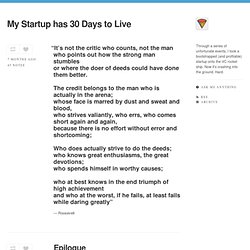

Angel or Devil: Who’s Really Investing In Your Start-Up? A friend called me heartbroken, crying.

She had spent months looking for investors to fund her fledgling startup and now she had a big problem. Someone was ready to give her the money. Trouble was, the cash came with a catch. The only investor willing to pony-up the money was someone she didn’t like. She also got the feeling he did not like her much either, and yet, he wanted to invest. Time was running out, she needed the funds and with no other investor ready to commit, she feared she’d have to take the money from someone she couldn’t stand. I felt for her and her dilemma piqued my curiosity. What differentiates a great early-stage investor from someone no entrepreneur wants to take money from unless they absolutely have to? I wanted to know what separated angel investors — those who add value to a company — from devil investors — those who destroy it.
The paper’s authors, Manzoni and Barsoux, describe a disorder they call the “set-up-to-fail syndrome.” What is this sabotaging syndrome? My Startup has 30 Days to Live. I wish I could write about how I capitalized on a once-in-a-lifetime moment, using it to find some way to save my team and this company.

I wish I could tell you about how I begged and pleaded my way to a soft landing, allowing my team to bring their awesome talent at building and creating to a company that would really be able to make these talents shine. Instead, I’m writing about the latest in my personal stream of fuck ups. As much as I’ve written about accepting the 30-day prognosis, I really don’t want to. My desire to find a safe landing is offset by the desire to stay true to who I am and what we were out to solve. We made some bad decisions along the way but there is something here, I just wish we had the time to figure out what it would be.
How do you fail with dignity when people depend on you? For the past 2 years, it seems that all i’ve been doing is selling dreams. When we raised our seed round, I spent months pitching, pitching and pitching again. Dignified, isn’t it? Spencerrascoff: Just got this email from a... Misadventures in VC Funding: The $24 Million Moz Almost Raised. Palihapitiya Decries Airbnb's Recent $112M Funding for Founder Control - Kara Swisher. Here’s some electric weekend reading for those interested in the push and pull between venture investors and start-ups in the frothy Web 2.0 environment.

In an email to Airbnb CEO and co-founder Brian Chesky (which I obtained, embedded below), former Facebook exec Chamath Palihapitiya, who now runs an investment fund called the Social+Capital Partnership, is passing on participating in the recent $112 million round for the hot online rental site that was announced in July.
The deal — which values the company at $1.2 billion — has not officially closed yet, but includes venture firms such as DST Global, Andreessen Horowitz and others. Previous investors include Sequoia Capital. Palihapitiya confirmed to me that it was his email and that his possible investment in Airbnb was small. Another $9.6 million is being used to buy secondary stock from current Airbnb shareholders, who have to render parts of their vested stakes for the money. Chamath Palihapitiya’s Statement On Airbnb Email Fiasco « UNCRUNCHED. My mouth fell open, literally, as I read the extremely private email from investor Chamath Palihapitiya (pictured) to Airbnb CEO Brian Chesky.

The message in the email was fine, even reasonable. But the fact that it was leaked to the press, and contained so many incredibly sensitive confidential financial details about Airbnb and its founders, amazed me. Disclosure: CrunchFund is an investor in Airbnb. The face that the email was between just two people (meaning very low chance of a random leak) and was written way more carefully than quick communications normally are, led me to immediately assume that Palihapitiya has some kind of crazy agenda to hurt the company. Mouth still open, I was preparing to write a story about how suicidal this was for Palihapitiya – clearly no startup would ever trust him with confidential information again. Luckily Palihapitiya picked up the phone when I called. I believe we know the source of the leak and are taking decisive action to address it. Like this:
How Pandora Survived More Than 300 VC Rejections. The 12 Worst Train Wreck Meetings Between Startups And VCs You Will Ever Hear. Vc.